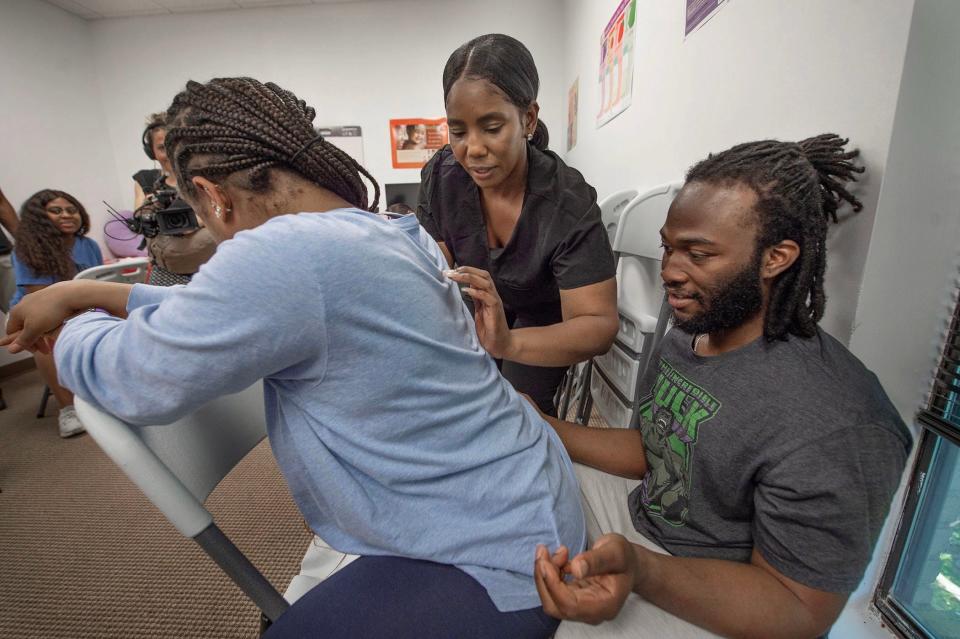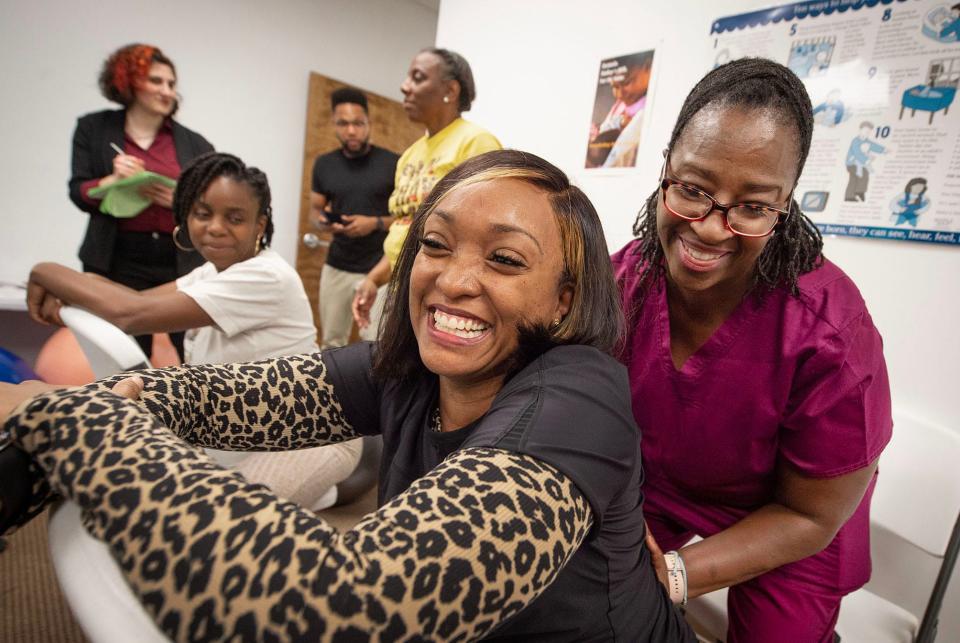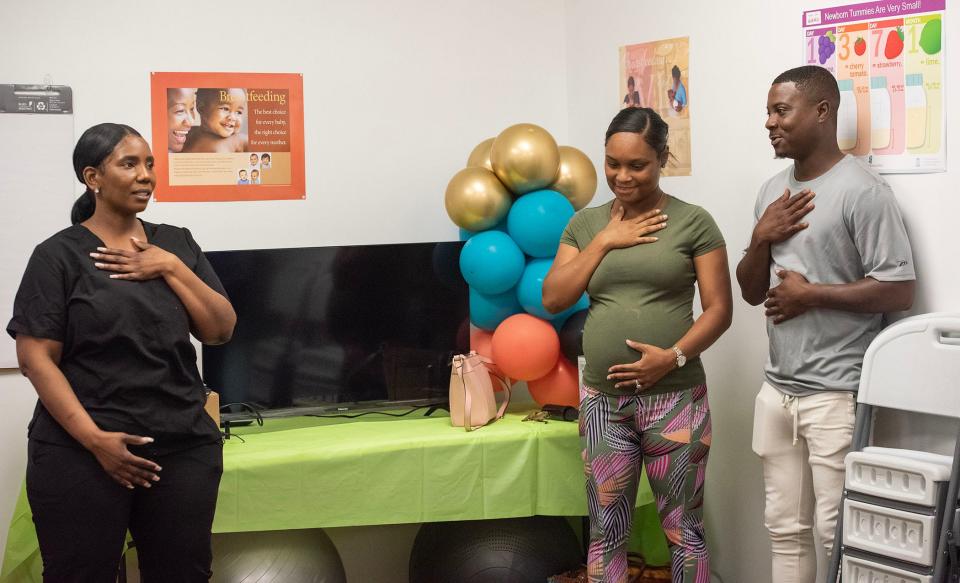Mississippi midwives' superpower: listening when doctors do not
This story is a collaboration between USA TODAY and The Tennessean as part of the documentary video series “States of America.” The full episode of “States of America” exploring Mississippi’s maternal health care crisis premieres at 8 p.m. and 10 p.m. Eastern on June 23 on USA TODAY Network's streaming channel available on Samsung TV Plus (Channel 1023), Roku, Plex and many more. You can also catch our full series on YouTube.
Seven pregnant Black women leaned on their husbands, mothers, sons and doulas, and slow-danced.
Leaning and swaying eases labor pain, doula Kashuna Watts explained to her childbirth class outside Jackson, Mississippi.
“It creates intimacy, it takes your mind away from what you’re doing, and Mom and Dad are both happy.”
Kyenechia and Willie Hart did a few exaggerated ballroom steps. The couple giggled.
Still, under the romantic scene lay an anxious reality. These women joined the free class to educate themselves and their partners so that they and their babies survive.
In the face of frightening maternal and infant mortality rates, Black women in the South are becoming doulas and midwives, creating alternative systems to support each other in childbirth, just like their great-grandmothers did.
Watts has two goals in her work. To be “to other women what I needed when I was pregnant,” she said. And “to knock those maternal mortality rates down.”
Motivated by loss
Doulas like Watts support people during pregnancy, birth and sometimes postpartum, educating and advocating. They are not medical personnel.
“We’re the glue that sticks everything together,” Watts said – finding resources, checking in, keeping on top of the pregnant person’s health.
Midwives provide medical services and can deliver babies. In Mississippi, there are certified nurse-midwives, who are registered nurses; certified professional midwives, who attended midwifery school; and community midwives, who usually complete informal apprenticeships.
Almost across the board, the roughly one dozen midwives and doulas we interviewed chose their professions due to tragedy or their own disempowering, infuriating experiences giving birth. Doctors and nurses didn’t listen when they said something felt wrong, they said. Midwives and doulas do.

Take Watts. She got pregnant shortly after her friend Tameka, and the women talked about raising their children together. Tameka died one day after giving birth, of eclampsia, dangerously high blood pressure during pregnancy.
Watts was diagnosed with preeclampsia. She spent the final month of her own pregnancy “panicking,” she said. “It was like, am I going to die?”
Watts believes that if her friend had had a doula, she would have lived.
The following year, Tameka's sister died three months postpartum.
What makes this care different
Doulas and midwives offer a different kind of pregnancy experience. For one, they tend to spend much more time with patients than doctors do. Watts estimated she makes 15-20 calls per day on top of visits.
For another, they generally have a holistic view of childbirth – considering it a natural process, not an emergency, that doesn’t usually require a doctor. Some clients give birth at their own homes.
Sisters in Birth health clinic has a nurse-midwife. But just as important are its community health workers, director Getty Israel said. Staff coach women from the start of pregnancy through postpartum with the goal of a full-term baby delivered vaginally, without induction or C-section, who is then breastfed. Sisters in Birth also helps patients with exercise and healthy eating to reduce conditions such as gestational diabetes that make birth more dangerous.
All this work makes a difference. Midwives “can help substantially reduce maternal and neonatal mortality and stillbirths,” the World Health Organization and United Nations wrote.
Some of the safest countries for birth have high midwifery rates, such as the Netherlands, where midwives attend 75% of births. Just four women die there per 100,000 births, according to the U.N. and the CIA’s World Factbook. In Mississippi, more than 65 Black women die per 100,000 births.
Dr. Daniel Edney, Mississippi’s health director, supports midwifery. To bridge the care gap, the state needs birthing centers, which are medically between a hospital and a home birth. “These are where low-risk deliveries need to go,” he said.
Israel is raising funds to open one.
Doulas, midwives face barriers
Edney may support midwifery, but across the South, these providers operate with only partial protections, regulation and insurance support.
In Mississippi, Georgia and North Carolina, certified professional midwives aren’t licensed, regulated or recognized by the state, according to the National Partnership for Women and Families. Mississippi professional midwives can’t practice in hospitals – only in homes. Mississippi nurse-midwives, on the other hand, can lose their licenses if they attend home births.
The medical system often resists alternative providers, say doulas and midwives. Some have seen hospitals post photos of doulas with a note: “Do not allow back on unit.” Legally, nurse-midwives often have to have physician collaborators. It's expensive, and some obstetricians don’t want to work with them, Israel said.
These policy decisions have financial consequences that put midwives and doulas out of reach for many families. Medicaid covers the majority of births in Mississippi, Alabama, Louisiana and Tennessee, according to the March of Dimes. In three of those states, Medicaid doesn’t pay for certified professional midwives, according to the National Academy for State Health Policy. It doesn't pay for doulas in any of them.
Unsurprisingly, only a tiny fraction of births are attended by midwives: 1% in Alabama, 2% in Mississippi, 3% in Louisiana and 9% in Tennessee, according to the Center for Mississippi Health Policy. Nationwide, doulas attend 6% of births, according the U.S. Department of Health and Human Services.

Watts is part of a doula team at Jackson Safer Childbirth that offers services for free. But the program is running out of grant money. Israel had to cut some of her clinic's health education and social work services. Moreover, midwifery education costs too much for many who want to join the profession and help their communities.
Birth and death: Meet the Mississippi moms who fear for their lives a year after Roe fell
Israel finds it frustrating.
“We know what works. What we need are resources to do this work on a larger scale,” she said.
But midwifery and doula care can’t solve all the problems that come with poverty.
Midwives attend only low-risk, vaginal births. Low-income women, especially women of color, are more likely to have the medical conditions and lack of prenatal care that make birth risky.
Individual efforts such as exercise can’t overcome all the negative impacts of what are called social determinants of health: conditions such as poverty, racism, unstable housing and lack of safe drinking water.
Finally, all home births require a hospital transfer plan in case labor goes sideways. In the South’s many maternal care deserts, that’s a challenge.
Why Kyenechia Hart commutes two hours for a childbirth class
By the end of the childbirth class, everyone was laughing over a quiz and then sharing pizza.
Kyenechia Hart’s upbeat attitude belied the seriousness of her condition. At 24 weeks, she was on five medications and had a stitch in her cervix to help keep it closed.
“I’m a high-risk patient,” she said.
She has been since her first pregnancy, in 2012. No one explained why. Her son was born at 27 weeks, the very start of the third trimester. In her second pregnancy, she learned that she has a short cervix, which can cause premature labor. That son came early, too.

Her fourth pregnancy is her miracle baby — doctors had said she couldn’t conceive again. It’s also been the roughest yet. Twice she’s gone to the emergency room with heavy bleeding. One of those doctors said, “This is a horrible pregnancy.” Hart cried herself to sleep.
Now what?: Mississippi midwives' superpower: listening when doctors do not
That’s why she’s been driving an hour from her home of Yazoo City, a maternal care desert, to see specialists and attend the biweekly childbirth class with her doula, Watts. (The ER was close to an hour away, too.)
With her risk factors, “the more knowledge, I feel like, would be the better,” she said.
The information Watts shared was important – for peace of mind and safety. How to recognize when the cervical mucus plug has come out before labor, and what it should look like – “bright red blood is not normal.” How to respond when a doctor or nurse is pressuring you: “Can we have time to think about it?”
Pregnancy should be a joyous time, Watts said afterward.
“We’re not asking for anything special. Just to be heard. Just for adequate health care and support,” she said. “Just to live.”
Danielle Dreilinger is an American South storytelling reporter and the author of the book “The Secret History of Home Economics.” You can reach her at ddreilinger@gannett.com or 919/236-3141. Andrea Kramar is a senior video producer at USA TODAY, currently focusing on the "States of America" series. Mona Iskander is a "States of America" freelance senior producer based in New York.
This article originally appeared on The American South: Mississippi midwives' superpower: listening when doctors do not

